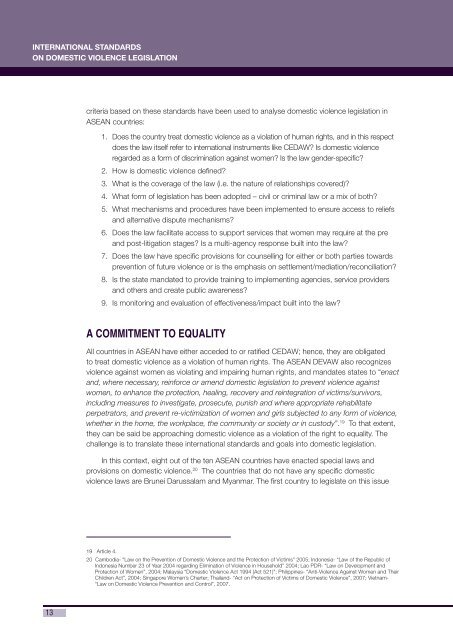Domestic Violence Legislation and its Implementation
Domestic Violence Legislation and its Implementation
Domestic Violence Legislation and its Implementation
You also want an ePaper? Increase the reach of your titles
YUMPU automatically turns print PDFs into web optimized ePapers that Google loves.
INTERNATIONAL STANDARDS<br />
ON DOMESTIC VIOLENCE LEGISLATION<br />
13<br />
criteria based on these st<strong>and</strong>ards have been used to analyse domestic violence legislation in<br />
ASEAN countries:<br />
1. Does the country treat domestic violence as a violation of human rights, <strong>and</strong> in this respect<br />
does the law <strong>its</strong>elf refer to international instruments like CEDAW? Is domestic violence<br />
regarded as a form of discrimination against women? Is the law gender-specifi c?<br />
2. How is domestic violence defi ned?<br />
3. What is the coverage of the law (i.e. the nature of relationships covered)?<br />
4. What form of legislation has been adopted – civil or criminal law or a mix of both?<br />
5. What mechanisms <strong>and</strong> procedures have been implemented to ensure access to reliefs<br />
<strong>and</strong> alternative dispute mechanisms?<br />
6. Does the law facilitate access to support services that women may require at the pre<br />
<strong>and</strong> post-litigation stages? Is a multi-agency response built into the law?<br />
7. Does the law have specifi c provisions for counselling for either or both parties towards<br />
prevention of future violence or is the emphasis on settlement/mediation/reconciliation?<br />
8. Is the state m<strong>and</strong>ated to provide training to implementing agencies, service providers<br />
<strong>and</strong> others <strong>and</strong> create public awareness?<br />
9. Is monitoring <strong>and</strong> evaluation of effectiveness/impact built into the law?<br />
A COMMITMENT TO EQUALITY<br />
All countries in ASEAN have either acceded to or ratifi ed CEDAW; hence, they are obligated<br />
to treat domestic violence as a violation of human rights. The ASEAN DEVAW also recognizes<br />
violence against women as violating <strong>and</strong> impairing human rights, <strong>and</strong> m<strong>and</strong>ates states to “enact<br />
<strong>and</strong>, where necessary, reinforce or amend domestic legislation to prevent violence against<br />
women, to enhance the protection, healing, recovery <strong>and</strong> reintegration of victims/survivors,<br />
including measures to investigate, prosecute, punish <strong>and</strong> where appropriate rehabilitate<br />
perpetrators, <strong>and</strong> prevent re-victimization of women <strong>and</strong> girls subjected to any form of violence,<br />
whether in the home, the workplace, the community or society or in custody”. 19 To that extent,<br />
they can be said be approaching domestic violence as a violation of the right to equality. The<br />
challenge is to translate these international st<strong>and</strong>ards <strong>and</strong> goals into domestic legislation.<br />
In this context, eight out of the ten ASEAN countries have enacted special laws <strong>and</strong><br />
provisions on domestic violence. 20 The countries that do not have any specifi c domestic<br />
violence laws are Brunei Darussalam <strong>and</strong> Myanmar. The fi rst country to legislate on this issue<br />
19 Article 4.<br />
20 Cambodia- “Law on the Prevention of <strong>Domestic</strong> <strong>Violence</strong> <strong>and</strong> the Protection of Victims” 2005; Indonesia- “Law of the Republic of<br />
Indonesia Number 23 of Year 2004 regarding Elimination of <strong>Violence</strong> in Household” 2004; Lao PDR- “Law on Development <strong>and</strong><br />
Protection of Women”, 2004; Malaysia “<strong>Domestic</strong> <strong>Violence</strong> Act 1994 (Act 521)”; Philippines- “Anti-<strong>Violence</strong> Against Women <strong>and</strong> Their<br />
Children Act”, 2004; Singapore Women’s Charter; Thail<strong>and</strong>- “Act on Protection of Victims of <strong>Domestic</strong> <strong>Violence</strong>”, 2007; Vietnam-<br />
“Law on <strong>Domestic</strong> <strong>Violence</strong> Prevention <strong>and</strong> Control”, 2007.

















